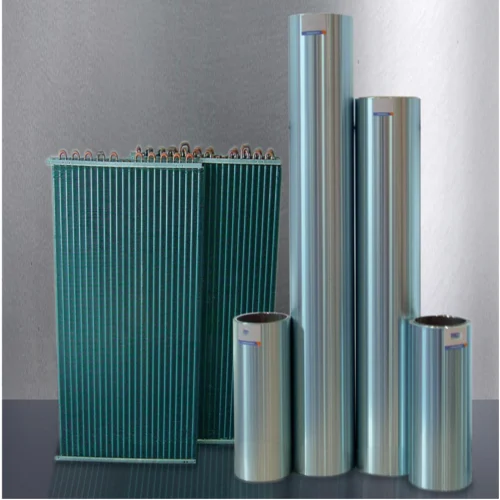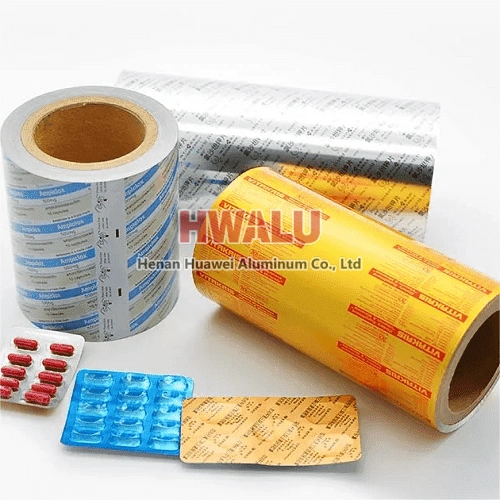What is AC aluminum foil? Air conditioning aluminum foil, often called AC foil or HVAC foil, is a type of aluminum foil used in the heating, ventilation and air conditioning (HVAC) industry. Air-conditioning aluminum foil is usually used to make heat-conducting fins for air-conditioning heat exchange and air-conditioning evaporators. It is one of the important alloys used in air conditioning manufacturing raw ma ...
why aluminum foil is used to wrap chocolate? How does aluminum foil protect chocolate? We found that both the inside and outside of the chocolate must have the shadow of aluminum foil! One is that chocolate is easy to melt and lose weight, so chocolate needs packaging that can ensure that its weight does not lose, and aluminum foil can effectively ensure that its surface does not melt; The second is the c ...
Aluminum foil for kitchen parameters Surface Teatment: One side bright, another side dull. Printing: coloured gold, rose gold Embossed: 3d pattern Thickness: 20mts, 10 mic, 15 micron etc Sizes: 1m, 40*600cm, 40x100 cm etc Characteristics and uses of kitchen aluminum foil Aluminum foil is a versatile and commonly used kitchen item that offers a range of benefits for cooking, food storage and othe ...
Know more about medicine aluminum foil Medicine Aluminum Foil is a special-purpose aluminum foil that is usually used for packaging pharmaceuticals. The raw material is also aluminum foil alloy. After treatment, its properties are very different from other types of aluminum foil, and it can be well applied to the pharmaceutical industry. Medicine aluminum foil material properties Aluminum foil used for pha ...
What are the common aluminum foil customizations? Thickness: The thickness of the aluminium foil can be customized according to the specific application. For example, packaging foil is usually thinner than kitchen foil. Size: Aluminum foil can be customized according to the size required, for example, aluminium foil for cooking can be cut to the size of a baking tray. Surface treatment: Aluminum foil can b ...
Product name: 8011 aluminum foil roll ID: 76MM, MAX ROLL WEIGHT: 55kg ITEM SPECIFICATION (MM) ALLOY / TEMPER 1 0.015*120 8011 O 2 0.012*120 8011 O 3 0.015*130 8011 O 4 0.015*150 8011 O ID: 76MM, MAX ROLL WEIGHT: 100 kg 5 0.015*200 8011 O
What is the difference between aluminum foil and tin foil? Can it be used for oven heating? Is aluminum foil toxic when heated? 1. Different properties: Aluminum foil paper is made of metal aluminum or aluminum alloy through rolling equipment, and the thickness is less than 0.025mm. Tin foil is made of metal tin through rolling equipment. 2. The melting point is different: the melting point of aluminum foil ...
1.Convenience: Large rolls of aluminum foil can be cut at any time, convenient for packaging food of various shapes and sizes, very flexible. 2.Freshness preservation: Aluminum foil can effectively isolate air and moisture, prevent food from going bad, and prolong the freshness period of food. 3.Durability: Aluminum foil has excellent heat resistance and tear resistance, can withstand high temperature and p ...
Product name: plain aluminum foil SIZE (MM) ALLOY / TEMPER 0.1MM*1220MM*200M 8011 O
Aluminum foil is often colloquially referred to as "tin foil" due to historical reasons and similarities in appearance between the two materials. However, it's important to note that aluminum foil and tin foil are not the same thing. Here's why aluminum foil is sometimes called "tin foil": Historical Context: The term "tin foil" originated at a time when actual tin was used to create thin sheets for wrappin ...
Aluminum foil is recyclable. Due to the high purity of aluminum foil materials, they can be reprocessed into various aluminum products after recycling, such as food packaging, construction materials, etc. Recycling aluminum, meanwhile, is an energy-saving process that involves melting down aluminum scrap to create new aluminum products. Compared to producing aluminum from raw materials, the recycling process of a ...










